Interrupted and postponed
Fragmented memories and reflections on fieldwork during a pandemic
On 29 January 2020 my fieldwork ended abruptly two weeks earlier than planned. I had spent the preceding week with my old friend Dechen at her family’s home in a farming village on the Tibetan plateau between Xining and Chengdu, the two largest urban hubs of Tibetan life located outside of the Tibet Autonomous Region in China. Holding tight to my piece of hand luggage that I had taken with me on what was supposed to be a short New Year’s trip, I boarded a plane and left China in a rush, uncertain about when I would return yet hopeful it would not be too long.
Ten days earlier Dechen, her younger cousin and I had travelled 1000 km from Chengdu to Xining by train to celebrate the Eastern Tibetan New Year Losar which coincided with the Chinese New Year in their home region. According to estimates around three billion trips were to be undertaken during this nationwide holiday session in 2020. I was excited to be part of it. After several weeks of exploratory research on urban Tibetan lifeworlds, the beauty industry and (temporary) medical migration in the megacity of Chengdu, my research base, the New Year’s celebration was a joyous occasion for a break. This exploratory research was supposed to be continued in September 2020 with twelve months of fieldwork.
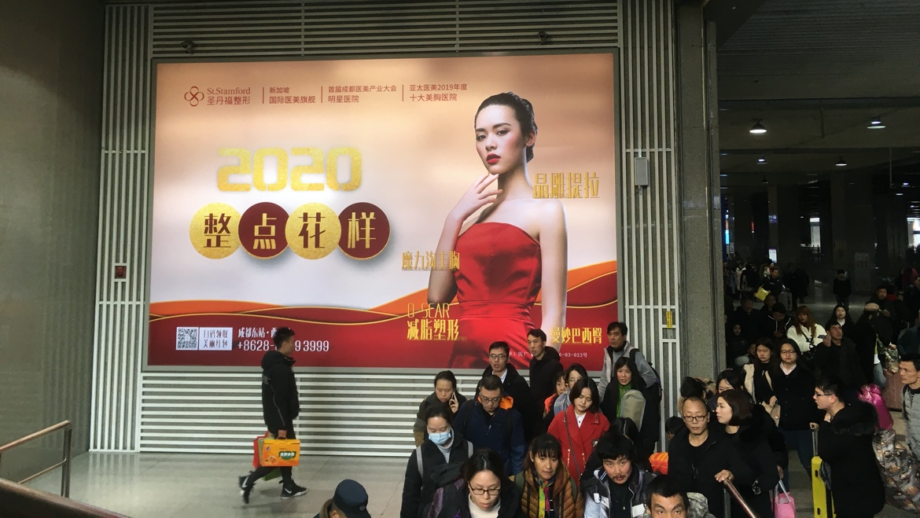
Figure 1: A major train station in Chengdu, January 2020. Photo by author.
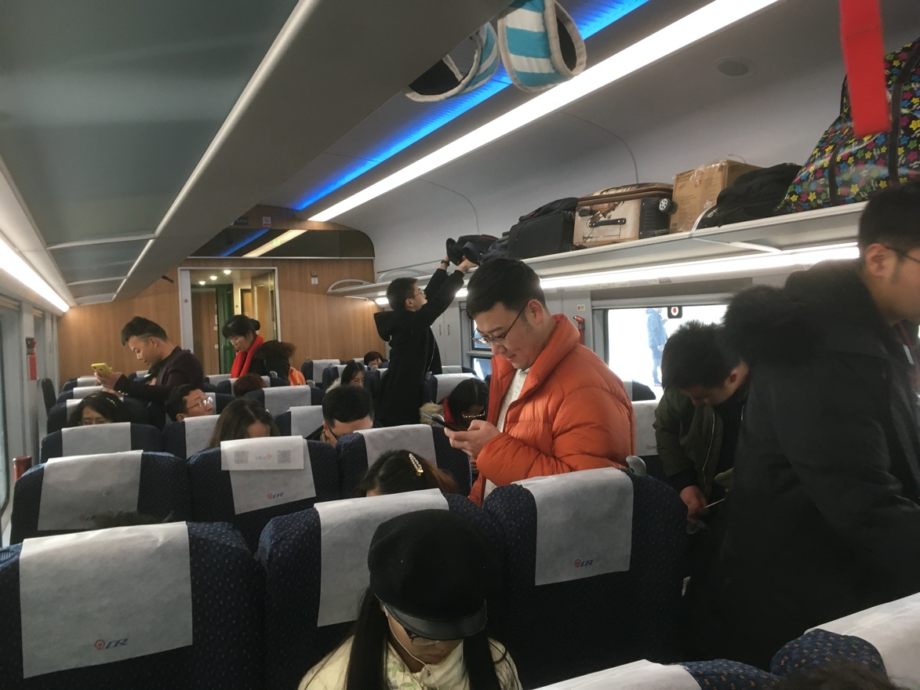
Figure 2: A full train during Chinese New Year, January 2020. Photo by author.
Witnessing an unfolding national health crisis
When we left Chengdu on 19 January 2020 we had heard about a novel virus in Wuhan, Hubei province. But it seemed like a localized phenomenon more than 1200 km away. Our perception changed rapidly over the next few days. The rhythm of the New Year’s preparations and celebrations became intimately linked to the unfolding coronavirus epidemic on the national, provincial and local level. No matter if we prepared meals, decorated the house, played cards or sat in the courtyard to warm ourselves in the bright mid-day sun: The news notifications ringing on Dechen’s phone constantly served as a reminder of rising cases of an unknown virus causing a serious disease sweeping through the country. Watching regional Tibetan comedy and music shows on TV – a favorite pastime during Losar evenings – became interspersed with national news and images showing experts in white gowns and workers disinfecting streets and hospitals. When the village’s Losar dances and all public religious ceremonies of nearby monasteries were officially cancelled, movements between neighboring villages and family gatherings restricted, and government employees ordered back to work despite their official holidays, we knew the situation and the measures taken locally were serious. Dechen, who was born in the mid-1980s, could not remember a single time since her childhood that Losar festivities had been cancelled. “It is going to be a TV Losar”, she commented on the new situation with a smile. Soon her nephew handed out disposable face masks purchased in the village store to everyone in the household, which according to village leaders we were supposed to wear as much as possible. Yet, we both were glad to be here and felt much safer than in Chengdu, where we saw the numbers rising daily.
On the social media platform WeChat[1]Tibetan friends and acquaintances quickly began sharing coronavirus related information as well as their hopes and prayers that Tibetan inhabited areas would be spared from the epidemic. Only the death of widely beloved basketball icon Kobe Bryant on 26 January 2020 nearly outnumbered news relating to the new virus for a day on my WeChat stream. Whereas individuals and institutions made infographics and videos in Tibetan available in late January, a concurrent lack of information in local languages was seen by concerned Tibetans as an obstacle from preventing the virus from spreading. A few days into Losar, we learned about first coronavirus cases in the Tibetan regions of Amdo and Kham. Dechen and her mother were quick in making an incense offering to abate the deadly virus everyone in the family grew more and more concerned about.
Turning into a risk – Navigating ethical dilemmas and fears of the unknown
When one day Dechen’s family members suddenly received phone calls and WeChat messages from the district hospital, a village leader and the police inquiring about my presence and reasons for being in China, I began feeling anxious about the implications of staying with the family during what we thought at the time was an unfolding national epidemic. On the same day two uniformed district police officers showed up at the family house unannounced “to talk”. After asking who was the head of the household and subsequently asking for Dechen’s fathers ID card, they sat down with Dechen and me at a table in the spacious and festively decorated living room declining with thanks the cooked Yak meat and milk tea offered by Dechen’s mother. An aunt, uncle and Dechen’s father sat a bit apart, but close enough to listen. “Why was I here? What was our relationship? Where had we been before? Had we been in Wuhan?” Upon request we produced our identification and travel documents. “Do not get a cold or fever!”, they ordered me. It was made clear several times during this meeting that the responsibility for my well-being was placed in the family’s hands. They instructed Dechen to inform them immediately once I would be leaving. Together we discussed that the highway to Xining might be closed off and inter-provincial travel was already severely restricted. Dechen, who did most of the talking, remained cooperative and calm throughout the visit, my pulse was racing.
After this encounter, I had no doubt that local authorities perceived me as a potential risk. I had turned into a burden for various actors. The consequences? Unknown. New and old ethical dilemmas of fieldwork in sensitive times with Tibetans in China surfaced (cf. Yeh 2006). Drawing the attention of local authorities to the family felt to me like harming them, even if direct contact with state actors was perhaps only meant to display local authority. The withdrawal of me – the foreigner – felt responsible to ensure the safety of the family and perhaps the village as a whole. In addition, after reading more news and consulting with friends throughout the country, Dechen concluded that it might soon be too late to not only leave the countryside, but China as a whole. “If you want to leave, you need to go now. Otherwise it might take months.” Given my teaching obligations in Switzerland, returning months later was not an option. Soon announcements of international airlines planning the suspension of flights to and from China should prove Dechen right. But how to leave with rumors about the traffic police sealing off highways and establishing roadblocks to limit people’s movements? We discussed options for me to travel during the night via an old street through a mountain pass to Xining. But who should drive? And was this safe at all? I felt guilty to cause complications. In the end, I was miraculously lucky that minibuses from the nearby town were still running the day after the policemen visited. A villager with a car dropped me there.
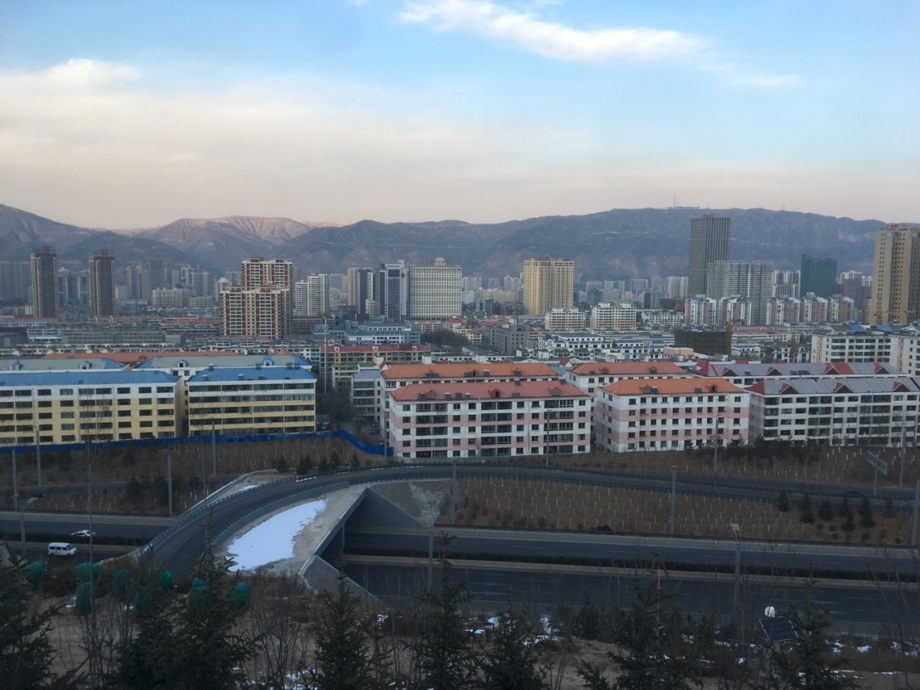
Figure 3 View of Xining. January 2020. Photo by author.
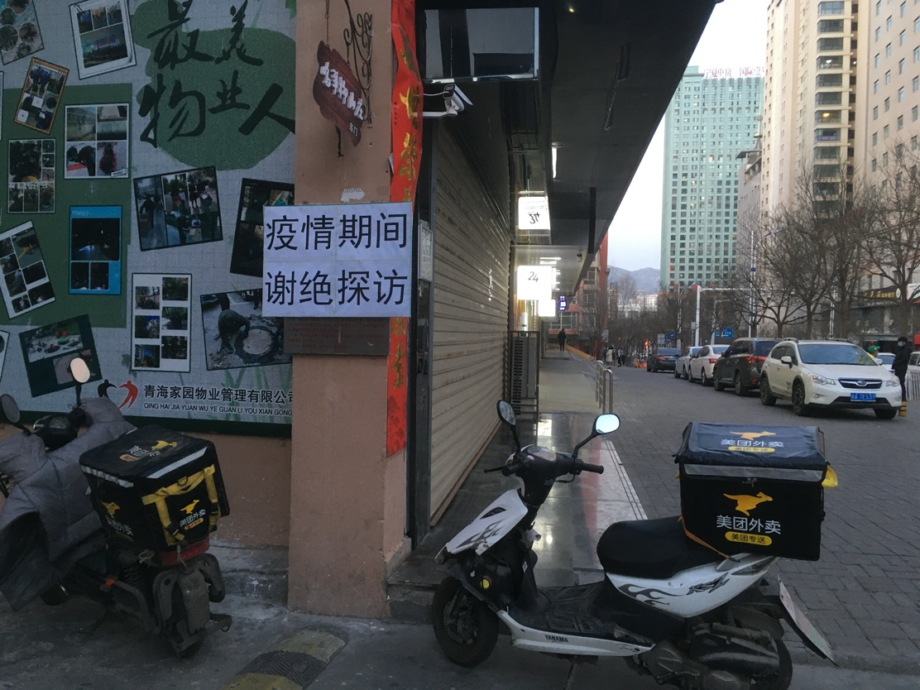
Figure 4 Announcement at a residential block: “During the epidemic situation visiting is declined”, Xining 2020. Photo by author.
One day after arriving in Xining and only a couple of days before all hotels shut their doors to foreigners following a local government announcement, I left China. My partner convinced me to book one of the next available flights from Xining without trying to return to my base in Chengdu first to pick up my belongings. Besides having a caring partner, I had other privileges. Having the financial means to book an intercontinental flight spontaneously for example is not something to be taken for granted for doctoral researchers.
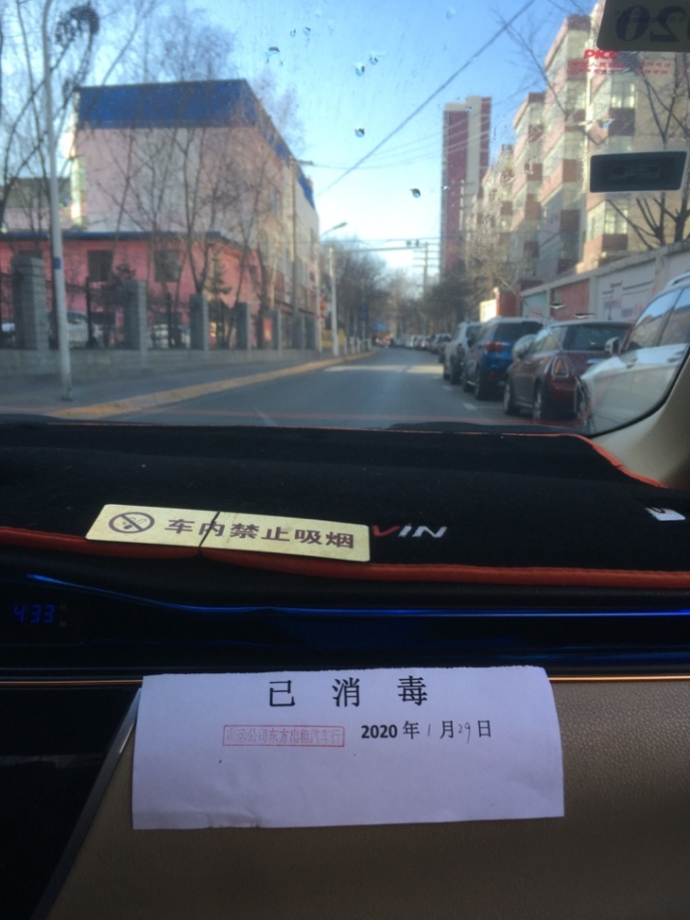
Figure 5 “Already disinfected”, taxi on the way to Xining airport, January 2020. Photo by author.
When I think back to the second half of January 2020 – 8 months later – skipping through fieldnotes, audio recordings and photos – I remember this time being filled with an overstimulation of unfiltered information and the concurrent lack of reliable information. The speed of enfolding events, the temporalities created by SARS-CoV-2 felt surreal and overwhelming. Being in an authoritarian state with a great number of authorities and state actors putting into practice new rules and regulations on various levels constantly was confusing and felt arbitrary at times. In less than 72 hours I traversed multiple geographies – the countryside, a district capital, the provincial capital Xining, Beijing airport, and Zurich – not knowing what kind of epidemic measures and regulations would be in place in each of these locations. How was I supposed to act responsibly at any given time? This question was not easy to answer.
Care and worries – Fostering new affective dynamics and learning to wait
Once back home like other researchers I soon felt the pressure of “pandemic productivity” (Pickwell 2020) while trying to adapt and understand my recent research experiences better. During the weeks following a self-imposed two-week quarantine[2], the worries I had for friends’, acquaintances’ and research participants’ safety and health took a novel turn. By the time Switzerland announced a formal state of emergency and introduced lockdown measures in mid-March 2020, China’s population had lived through much harder restrictions. People I knew in China navigated quarantines, isolation, cancelled trips, prolonged stays, financial hardships and unknown futures. Now they expressed their care for me over WeChat about the situation worldwide and in Europe, inquiring about mine and my family’s situation. With numerous chat and voice messages they reminded me to leave the house as little as possible, wear a face mask at all times and stay strong. Dechen kept sending pictures of home and family that also documented how they responded to the threat of SARS-CoV-2. One picture for example showed her, her siblings and mother wearing protective amulets. She also shared her surprise when one of the policemen interrogating us asked her “as if he had known you for a long time”, about my health and current situation. What CD Green calls the “collective trauma” of a global pandemic, even if experienced from extremely different positionalities, and the consequential care I received, created new bonds with friends and research participants. Possibly this includes a police officer in rural Tibet whose positionality and subjectivity I had reduced too quickly to his state employment leaving little room for complexity. These new exchanges highlighted the “affective settings of fieldwork” (Funk & Tajib 2019: 138). They questioned a narrow concept of “the field” and taught me to think of care as multi, rather than one-directional as I had unknowingly done during previous research stays.
Observing the pandemic enfolding globally, listening to accounts of and reading about racist, xenophobic attacks in Europe, the US as well as China and learning about the travel ban placed on foreigners by China’s Ministry of Foreign Affairs in late March were all contributing factors for me to let go of my research plans for the second half of 2020 early on. The “emotional labor” (Spencer 2010) accompanying anthropologists during, after, but importantly, also before fieldwork was weighing on me. I needed a plan when planning did not work for no one anymore. As a flight forward and with the support of my supervisors, I moved fieldwork one year into the future. “Waiting is a particular engagement in, and with, time (Janeja & Bandak 2018: 1)” and a shared human experience (ibid.). I am anxiously waiting to find out what kind of fieldwork encounters will become (im)possible during and after life with COVID-19 and how new forms of surveillance in the name of monitoring citizens’ health affect everyday life in Tibet. Waiting, it also appears to me, makes me aware constantly of my privileges that so far afforded me the comfort of living without paying too much attention to the dynamics and affective dimensions of waiting in uncertainty. Needless to say, I am still learning to wait.
Written on 6 October 2020 and revised on 9 October 2020
Hannah K. is a doctoral researcher and teaching associate in social and cultural anthropology at a Swiss university. Her research interests include urban anthropology as well as the anthropology of the body and gender.
Footnotes
[1] WeChat (Ch. Weixin, Tib. skad ‘phrin) is a multi-purpose social media, messaging and payment application.
[2] In late January and early February my university did not have any official guidelines for people returning from risk areas in place yet. I made the decision for the quarantine in consultation with my supervisor.
References
Funk, Leberecht & Ferdiansyah Thajib. 2019. Intimacy and Care in the Field: Introduction. In: Stodulka, Thomas, Dinkelaker, Samia & Ferdiansyah Thajib (eds.). Affective Dimensions of Fieldwork and Ethnography. New York: Springer, 137– 142.
Manpreet K., Janeja & Andreas Bandak. 2018. Introduction: Worth the Wait. In: Manpreet K., Janeja & Andreas Bandak (eds.). Ethnographies of Waiting: Doubt, Hope, and Uncertainties. London: Bloomsbury Publishing Plc, 1–39.
Spencer, Dimitrina. 2010. Introduction. Emotional Labour and Relational Observation in Anthropological Fieldwork. In: Davies, James & Spencer Dimitrina (eds.). Anthropological Fieldwork – A Relational Process. Cambridge: Cambridge Scholars Publishing, 47–60.
Yeh, Emily T. 2006. ‘An Open Lhasa welcomes you’: Disciplining the Researcher in Tibet. In: Heimer, Maria & Stig Thogersen (eds.). Doing Fieldwork in China. Copenhagen: NIAS Press, 96–109.































